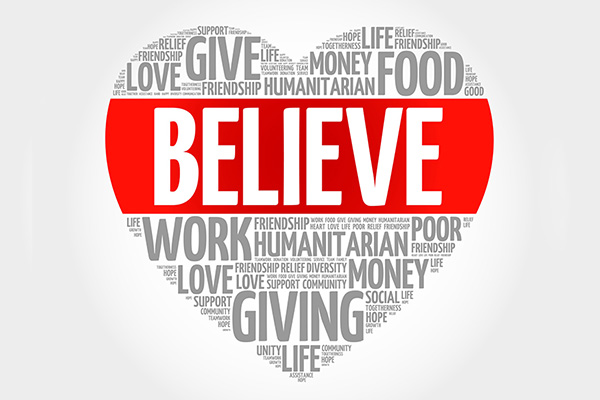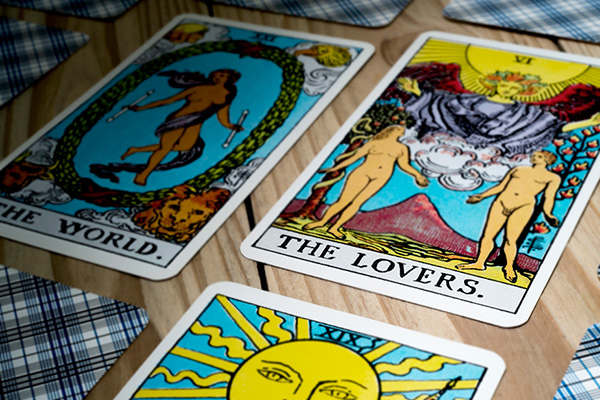kindness
To Lie, To Live, To Believe
 Our brains are naturally wired to recognize patterns, find connections between seemingly unrelated things, and draw analytical conclusions from our observations. We all use this ability every day without even knowing it.
Our brains are naturally wired to recognize patterns, find connections between seemingly unrelated things, and draw analytical conclusions from our observations. We all use this ability every day without even knowing it.
It is a talent we inherited from our ancient ancestors. Professor Robert C. Barkman explains that “pattern recognition was key to the survival of our Neanderthal ancestors, allowing them to identify poisonous plants, distinguish predator from prey, and interpret celestial events. Today, pattern recognition plays new, but just as important roles in diagnosing diseases, inspiring new ways to safeguard data, and discovering new planets.”
This amazing ability is however seldom mentioned or considered in spiritual and metaphysical circles. But Spirit has over the years guided me towards greater spiritual insight and metaphysical understanding by taking me on interesting journeys of analysis and pattern recognition towards profound insights and relevations.
For example, while meditating during Easter a few weeks ago, my guides took me ‘down a rabbit hole’ on the decisive word believe. The first insight I discovered was that right in the middle of the word ‘believe’ there hides another, more disheartening little word: lie.
Of course, ‘believe’ is a good word. It is the cornerstone to faith and living a spiritually empowered life. But the hidden word ‘lie’ inside it reminds us that we must also have a living faith for it to be authentic and powerful. And, if you drop the letter ‘v’ into ‘lie,’ it becomes the word ‘live.’
The Mystical Tale Of The Lovers Card
 I have made an illuminating discovery regarding the Lovers card in the Tarot. In all the years I have been practicing cartomancy, I never realized certain aspects of this card’s mytsical symbolism and its portrayal of the healing power of divine love.
I have made an illuminating discovery regarding the Lovers card in the Tarot. In all the years I have been practicing cartomancy, I never realized certain aspects of this card’s mytsical symbolism and its portrayal of the healing power of divine love.
In the classic Rider-Waite rendition, it is commonly accepted the card merely depicts an archetypal Adam and Eve in the Garden of Eden, with a scheming serpent lurking behind Eve and the majestic figure of an angel looming overhead. Recently, I learned from a psychic colleague’s podcast that the angelic figure portrayed in the in card in fact represents the Archangel Raphael. I’ve always been fascinated by Raphael, the angelic healer of minds, bodies and souls.
Raphael is first mentioned the ancient Hebrew apocalyptic book of Enoch, as well as the deuterocanonical book of Tobit. Also known as the apocrypha, the deuterocanonical books are not traditionally included in Protestant and Jewish canonical texts, but it is recognized in the Roman Catholic and Orthodox traditions.
The book of Tobit relays the story of a blind man named Tobit and his son Tobias, whom he sends to retrieve an investment of silver he had deposited in a town in Media in north-western Iran. With the protection and guidance of the angel Raphael, Tobias arrives along his journey in Ecbatana, the capitol of Media, where he meets a young woman named Sarah.
Sarah is in utter despair and praying for death, as she has already lost seven husbands. Each of her lovers had been murdered on their wedding night by the demon Asmodeus, who is obsessively in love with her. Angel Raphael encourages Tobias to marry Sarah and then helps him to defeat the homicidal demon.
The Life-Long Journey Of Self-Love
 Self-love is essential for mental, physical, and emotional well-being. It is vital to have a positive, loving attitude towards yourself and take care of your own needs. Not only is this essential for living a happy and healthy life, but it also empowers you to be more loving and caring towards others.
Self-love is essential for mental, physical, and emotional well-being. It is vital to have a positive, loving attitude towards yourself and take care of your own needs. Not only is this essential for living a happy and healthy life, but it also empowers you to be more loving and caring towards others.
Self-love is often misunderstood. Many people think that self-love is only about pampering oneself, indulging in extravagance, or buying yourself expensive things. It is much more than that. It is not about being selfish, self-indulgent, or narcissistic. Instead, it is about accepting yourself, taking care of yourself and understanding your true worth.
Truly loving yourself is therefore about knowing your worth, appreciating your unique strengths and abilities, and treating yourself with compassion and kindness. It is also about taking personal responsibility for your life, making choices and decisions that serve your highest good, and letting go of negative thoughts and self-destructive behaviors.
It is also important to realize that self-love is a journey, not a destination. It is a life-long process that is part of our soul purpose in this lifetime. It is a state of being that requires patience, dedication, commitment and effort.
Cultivating self-love begins with understanding yourself, accepting your flaws, and learning to forgive yourself. It involves setting boundaries and taking responsibility for your own needs and happiness. It is also about cultivating positive relationships and learning to trust yourself.
Stop Surviving And Start Living
 The past three years, I have heard many people say they’re living in ‘survival mode.’ For some it has been about health and personal safety, for others it was isolation and loneliness, or bereavement and grief, or loss of employment and financial security.
The past three years, I have heard many people say they’re living in ‘survival mode.’ For some it has been about health and personal safety, for others it was isolation and loneliness, or bereavement and grief, or loss of employment and financial security.
It has certainly been an unprecedented, challenging time for our generation. And at times it has indeed been an actual fight for survival, which many tragically did not survive. Many families are still grieving the loss of their loved ones.
Sadly, for some it has also been a time of fearing many things that never happened. It has also been a time that revealed how some folks may be in need of a major ‘privilege check.’ For example, I personally know people who were excessively anxious during the quarantine lockdowns because they were eating too much and gaining weight, or were upset because they could not go to the salon or spa, while there are people in the world who were not even able to feed their families, or worse, had nowhere safe to take shelter.
The global pandemic has indeed been a unique opportunity to reflect on our beliefs, values, and what truly matters to us. Not everyone made the most of this prospect. It seems for some it is still difficult to move beyond the self-defeating mindset of ‘it’s a struggle to survive.’
Yes, life is sometimes definitely hard for all of us. The past three years proved that once again on a global scale. Life can throw major curve balls our way and we all handle things through our personal lens on the world. Some of us are more resilient than others; and some of us more privileged than others. Being in ‘survival mode’ is therefore relative to the individual.
Walking Two Moons In Their Moccasins
 To judge, or not to judge, that is the question. Now, even the least religious of Christians will tell you that it is not a good idea to stand in judgment of others. In fact, Matthew 7:1-5 clearly states: “Do not judge, or you too will be judged. For in the same way you judge others, you will be judged, and with the measure you use, it will be measured to you.” However, there is a little-known addition to this spiritual wisdom to be found in John 7:24: ” Stop judging by mere appearances, but instead judge correctly.”
To judge, or not to judge, that is the question. Now, even the least religious of Christians will tell you that it is not a good idea to stand in judgment of others. In fact, Matthew 7:1-5 clearly states: “Do not judge, or you too will be judged. For in the same way you judge others, you will be judged, and with the measure you use, it will be measured to you.” However, there is a little-known addition to this spiritual wisdom to be found in John 7:24: ” Stop judging by mere appearances, but instead judge correctly.”
Wait a minute? Did Jesus not instruct us never to judge? Yes, he implored us not to judge, but he also asked us to filter our experiences through the wisdom of spirit, or the eyes of divine love, before making any judgment. Indeed, some sound judgment is necessary in life. If we never judge anything at all, we may potentially become doormats to others. That’s certainly not what any wise spiritual teacher would recommend. But we need to be sensible, humble and kind in the process. We must ask for divine wisdom and guidance when considering what we say to others, as well as ourselves.
Judgment is related to karma and the ‘golden rule,’ in that we receive back what we dish out. This is not good if we hold onto our rigidity, unable to see others’ points of view. But if we open our minds and see it from another’s point of view, then we will more fairly and compassionately balance our judgments. We must remember the Native American wisdom, “Don’t judge a man until you have walked two moons in his moccasins.”
The Spiritual Practice Of Flower Power
 Every now and again, I purchase a bouquet of flowers as a gift to myself. Placing a vase of flowers on your home altar or sacred space adds nature-inspired ambiance, brightness, and sensuality to one’s spiritual self-care.
Every now and again, I purchase a bouquet of flowers as a gift to myself. Placing a vase of flowers on your home altar or sacred space adds nature-inspired ambiance, brightness, and sensuality to one’s spiritual self-care.
I also love to diffuse the essential oils of flowers, especially when I meditate, but they don’t have the tangibility and energetic beauty of a stunning array of fresh blooms. Analogous to eating whole food versus taking a supplement, fresh flowers represent the wholeness, divine design, and awe-inspiring beauty of Gaia, Mother Nature, our Earth Mother, the Divine Feminine.
Unadulterated, the ‘flower power’ of a beautiful bouquet commands marvelous healing energies, blesses the giver, and inspires bountiful gratitude in the recipient.
The most powerful spiritual practice involving flowers is to plant your own flower garden with perennial varieties, such as tulips, black-eyed susans, and chrysanthemums. With careful planning around the seasonal calendar one can also have different species in bloom at different times throughout the entire year.
Cultivating a thriving garden of flowers is a magnificent form of energy work. It attracts and manifests emotional healing, abundance, and the fulfillment of wishes, especially in aspects of romance, marriage, fertility, and parenthood. By lovingly nurturing and caring for the delicate beauty of living flowers, we invite much love, beauty and abundance into our lives.
Respect Is A Blessed Spiritual Practice
 Nothing disturbs the existence of the person who is spiritually conscious and respectful. For the believer her faith is the rock that nothing shakes. The worst storms can come, yet she’s still there, firm in her belief.
Nothing disturbs the existence of the person who is spiritually conscious and respectful. For the believer her faith is the rock that nothing shakes. The worst storms can come, yet she’s still there, firm in her belief.
A faithless, disrespectful life without higher consciousness is perilous at best, and rife with fears, and many tears. The days tend to get darker, and the future more and more uncertain. There is little to offer hope, and life seems meaningless and transient.
But faith makes life full, smooth, and blessed. Surrendering our fears and worries to God, Source, Spirit, the Divine is liberating and transcendental.
Of course, a fulfilled, spiritually aware life is not without challenges, problems, responsibilities, and effort. Idleness and laziness will delay our soul evolution. Spiritual growth and enlightenment require effort, dedication, passion, and commitment.
For all worthwhile achievements, victories, and successes in life, we must have faith, courage, and respect; be ethical in all our choices and actions; and clearly decide what we want to achieve.
Everything that unfolds in our life begins with our own attitude and our level of respect. Those who do not respect themselves, others, and nature, cannot demand any respect in turn. Respect must guide us every day in everything we think, say, and do. It is the most important moral value and duty of every soul in human form.